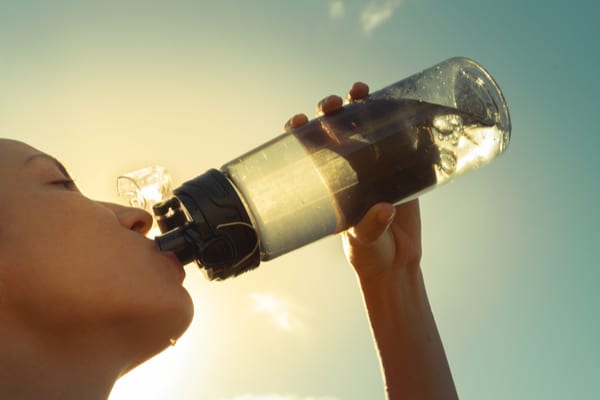Water is essential for life. Nearly 60% of the human body is made up of water. Not only is water fundamental in building cells, but it’s also critical for regulating body temperature, healthy digestion and electrolyte balance.
When your body does not receive the fluid it needs, it can become dehydrated, which can manifest itself in various forms. Mild symptoms of dehydration usually include dry skin, dry mouth, dark or infrequent urination, feeling tired and dizziness. According to MedlinePlus, serious complications of more extreme dehydration can include confusion, fainting, rapid breathing alongside an elevated heartbeat and shock.
Preventing dehydration is very important to help ensure your body is feeling and functioning at its best. While drinking water is an important part of the equation to avoid becoming dehydrated, it’s not the only piece of the puzzle. Here are four surprising reasons that you may be dehydrated with tips on how to prevent it from happening again.
1. Your Sleep Schedule
Whether you log 6 or 10 hours of sleep per day, both oversleeping and undersleeping can cause dehydration. A 2019 observational study published in the journal Sleep found that of the adults from China and America they studied, those who slept 6 hours or less per night were at greater risk of inadequate hydration than those who slept 8 hours. Relying on prior research from a study published in 2013 in Nature Neuroscience, Los Angeles-based registered dietitian and best-selling author of The MIND Diet, Maggie Moon, M.S., RD, suggests the reason that not sleeping enough may cause dehydration may be related to the disruption in the natural circadian signal—called vasopressin—that tells the body to hold on to fluids late in the normal sleep cycle.
While no consistent association was found when adults slept 9 hours or greater per night, Moon cautions on logging too many hours. Moon shares, “We lose fluids through our skin and respiratory systems all the time, even when at rest. Oversleeping simply means more hours of losing fluids without replenishment, leaving the body dehydrated.”
2. Flying in a Plane
Traveling may disrupt many areas of your health, hydration included, notes performance dietitian Jenna Braddock, M.S.H., RD, CSSD, CPT. According to a 2020 research study published in Nutrients, the cabins of airplanes are controlled environments with much lower humidity than typical air. This can impact your fluid and hydration levels, leaving you dehydrated after your flight. While you may not be able to avoid flying, Braddock recommends traveling smart and trying to hydrate before your flight while continuing to do so during your trip.
3. Excessive Sugar Intake
The 2020-2025 Dietary Guidelines for Americans (DGA) recommends limiting your intake of added sugar for the multiple areas of health they can affect, which surprisingly includes hydration. Moon notes, “A [high-added-sugar] soda habit can lead to dehydration. It may sound counter-intuitive since soda comes in a liquid form, but excessive [added] sugar intake can cause cells to flush their water into the body to help restore balance. This, in turn, can lead to frequent urination. All of this leaves the body dehydrated.”
Science is still evolving with human studies to support this, but there is available animal research supporting Moon’s statement. A 2016 study published in the International Journal of Physiology Regulatory, Integrative and Comparative Physiology found that rehydrating with a soft-drink-like beverage actually worsened dehydration in animals while exacerbating dehydration associated with kidney damage. While animal studies are not ideal in extrapolating findings to humans, it does provide insight on the science on soda, added sugar and their potential effect on hydration in humans.
4. Drinking Alcohol
Maybe this is news to you, and maybe not. Either way, it’s important to understand that drinking alcohol can lead to dehydration, “especially if you do not consume it with food and other beverages”, Braddock shares. According to a 2018 study published in the International Journal of Psychopharmacology, alcohol can suppress the hormone vasopressin, which acts to hold on to water in the body.
When this happens, this can affect urination, notes Braddock. “This action increases the amount of pee you produce and, therefore, you have to go more. If you’re drinking and intoxicated, you might not be dialed into the fact that you’re peeing a lot and need to drink water. A great strategy to employ when planning to drink alcohol is to be well hydrated first and then alternate drinks with a glass of water.” That’s also a good way to keep from getting a hangover – which many times is due to dehydration – later!
—
Photo Credit: KieferPix / Shutterstock.com
